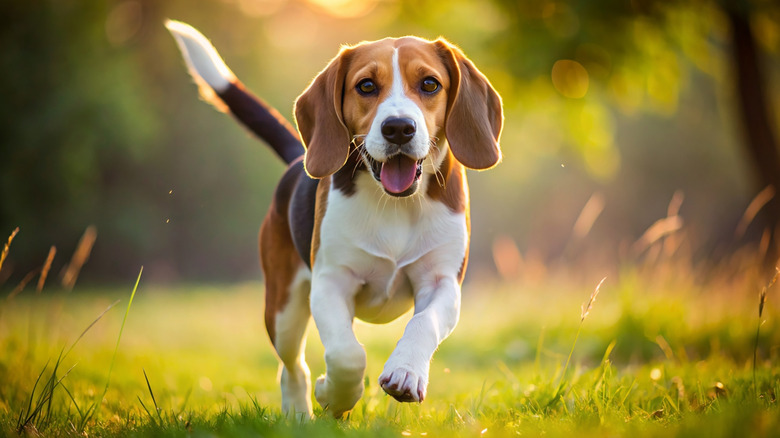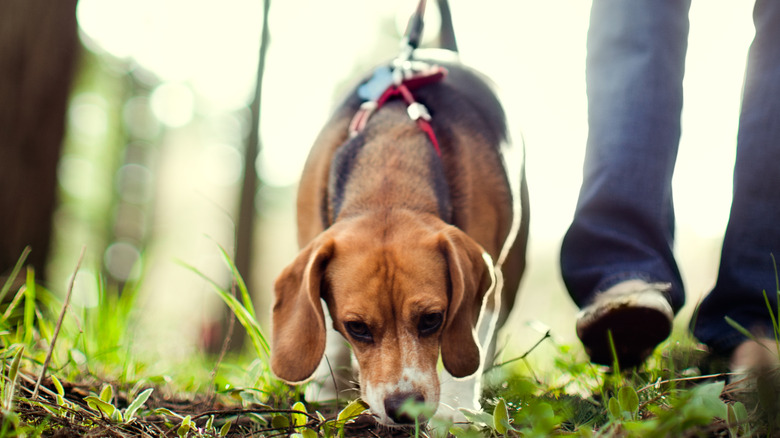Why Beagles Are Some Of The Most Difficult Dogs To Train, According To Pros
They are adorable small-to-medium-sized dogs with floppy ears and big smiles that are often touted as great family-friendly pets. That's right! We're talking about beagles. These often tricolor cuties are known for being happy-go-lucky, energetic, and intelligent dogs who love their people and are great with children. However, before you slap a red bow on a fuzzy beagle puppy and present it to your family on Christmas morning, it's important to know that they're not the easiest pups to handle. Additionally, a beagle may not be the best choice for first-time dog owners or people who don't have the time to dedicate to very consistent, thorough training.
Beagles were historically bred for hunting, so their behavior is still influenced by the history and characteristics of hunting dogs. In short, they may be skilled in woodsy working situations, but tough to handle in the home. Much of the trouble you'll run into when training your beagle is because of their nose. Celebrity dog training expert Chrissy Joy explained the unique challenges of training this breed to Reader's Digest. She noted that beagles, in particular, can be difficult to train — especially in outdoor environments or when off-leash. They can get extremely preoccupied with the smells around them and tune everything else out to follow scent trails — and that's just one quality of this little hunting pup that makes them tricky to train.
Beagles are energetic, intelligent, and independent
Beagles are known for being happy, cheerful dogs, but that doesn't mean they're low-energy. The experts at Michael's Pack Dog Training highlighted this trait, "Beagles have an innately high amount of energy. Many people will love the boisterous attitude that beagles possess, but it can make them somewhat difficult to train." Beagles require at least one hour of exercise every single day to remain their jovial selves. If your beagle doesn't get the exercise they need every day, they can easily start displaying destructive behavior.
Beagles are often just too busy doing their own thing to think about listening to you. As hunting dogs, they were bred to make decisions independently of their owner, so sometimes they seem to think they know what's best. Luckily, training your beagle is not impossible, and they have tons of redeeming qualities. They're often content to socialize with people and other dogs, and they really are happy, companionable dogs.
Since they're so scent-driven, it can be difficult to get them to listen to you if they're distracted. Sorry, but your "Sit!" command just isn't as exciting as the aroma of squirrels. Putting that nose to work in activities such as scent work may benefit their training and add enrichment. Jemma Milne from Milne and Mutt dog trainers shared why this is important, "A beagle who doesn't get to use their nose will most likely use their nose in ways that you wish they wouldn't." Give your beagle the opportunity to put their adorable nose to good use in a controlled way that works for everyone!
How to train your beagle
There are some majorly important skills and behaviors to focus on developing at each stage of training to prevent behavioral issues in your beagle. Beagles should be socialized with other people and dogs consistently, starting very young, between eight and 16 weeks old.
The goal is to get them to build confidence by teaching them to enjoy their training tasks. Of course, like most dogs, beagles tend to respond best to positive reinforcement training. Many beagles are very food-driven, so using treats in the training process — along with highly encouraging verbal praise — is a great way to instill that confidence in your beagle pup and also to motivate them to continue performing those tasks. Beagles also thrive on being around family, always wanting to be a part of the action — which can be a useful source of motivation when training.
Other training goals include teaching them basic commands and what (and what not) to chew, enforcing boundaries, and crate and potty training. With dedicated and consistent people training them — and plenty of exercise to get their energy out (yes, you even need to figure out how to exercise your dog on rainy or snowy days) — beagles can be fantastic family dogs.


